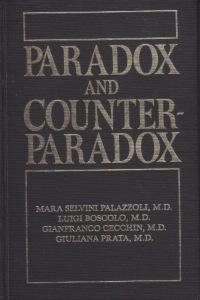 In college I took enough psychology courses that I could have minored in it, had I simply declared it.Focused on ministry at the time, this declaration never happened.My own psychological issues (who doesn’t have them?) show up, I suspect, to those skilled at spotting such things, and friends sometimes suggest books I might enjoy reading.As a result I recently finished Paradox and Counter-Paradox by Mara Selvini Palazzoli, Luigi Boscolo, Gianfrancro Cecchin, and Guiliana Prata.Attempting to summarize the study would necessarily over-simplify what is clearly a very complex topic—what used to be called schizophrenia—but the basic idea can be explained.These psychoanalysts worked as a team to help patients with (since it was the 1970s) schizophrenia.Realizing that the basic mental processes are developed within a family, their practice used group therapy to treat families rather than singling out the “sick individual.”This book is an account of the methods they used.
In college I took enough psychology courses that I could have minored in it, had I simply declared it.Focused on ministry at the time, this declaration never happened.My own psychological issues (who doesn’t have them?) show up, I suspect, to those skilled at spotting such things, and friends sometimes suggest books I might enjoy reading.As a result I recently finished Paradox and Counter-Paradox by Mara Selvini Palazzoli, Luigi Boscolo, Gianfrancro Cecchin, and Guiliana Prata.Attempting to summarize the study would necessarily over-simplify what is clearly a very complex topic—what used to be called schizophrenia—but the basic idea can be explained.These psychoanalysts worked as a team to help patients with (since it was the 1970s) schizophrenia.Realizing that the basic mental processes are developed within a family, their practice used group therapy to treat families rather than singling out the “sick individual.”This book is an account of the methods they used.
Seeing schizophrenia as a family issue rather than an individual one, the therapists saw the identified patient as often a child trying to keep family expectations in order.The psychoanalyst team called this a “game” played by families seeking homeostasis—the perceived state of balance between members to assure that things stay the same.The psychotic member enables this to happen and families, as recounted in some of the cases, clearly try to manipulate the situation to keep this strange and awkward balance.The doctors used paradoxical (thus the title) scenarios to treat such families and reported a good rate of success.The focal point of their work was often not on the “sick” member, but on the group dynamics which led to the sickness.
The idea is a fascinating one.We are all members of families (with some exceptions), and the way our group functions is, for the most part, acceptable.Dysfunction, however, sometimes leads to psychosis, which, according to these authors, is a state of affairs best treated on a family scale.While it may be easy for me (having grown up in a clearly dysfunctional family) to see this, I sometimes wonder at how widespread mental issues really are.Our species lives a highly unnatural existence for evolved beings.Our work together in family units often leads to conflicts, overt and subtle.Children—often the identified patients here—can see such things much more clearly than we frequently suppose.Afraid of the consequences, they learn to play the game to keep the situation stable, if untenable.There’s great insight here, even if the book is a touch outdated; our learning about the human mind is never-ending and it makes perfect sense to pay attention to the context when wondering about the results.
